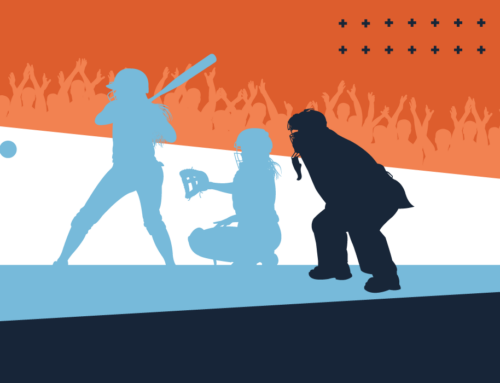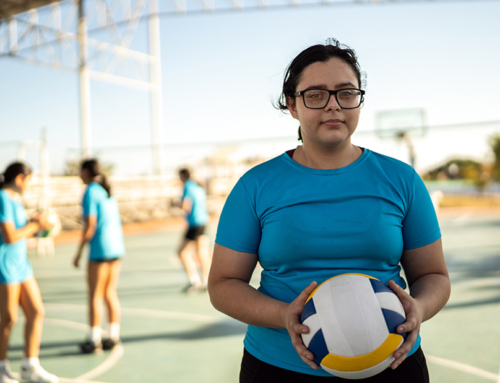This episode of Listen Up Bailey is joined by Scott Spillman, Executive Director of Mudsock Youth Athletics in Fishers, Indiana. Mudsock is a youth athletic organization with 12 leagues and over 10,000 kids participating in different sports spreading across all three seasons. Spillman and Bailey catch up on what Mudsock is up to now and discuss the pandemic’s challenges. Spillman describes the work he and his staff put in and how there was a point where they didn’t know if kids were going to get back on the field. Spillman credits the community of Fishers and the staff at Mudsock for putting together a game plan for getting through the sports calendar. Their process was powered by much more than just the athletes and staff, so listen up!
Is your 1st through 12th grader ready to go the distance this fall? Our cross country league focuses on fitness, fun and training. Wondering what their program is like including distances for each age group? Head over to https://t.co/3ETY0Gu3Z5. Register: https://t.co/yndc6D2MZS. pic.twitter.com/jTeGCcgVwI
— Mudsock Youth Athletics (@MudsockYouth) May 17, 2021
Transcription Of The Interview Below
Bailey Arredondo:
All right. Okay, here we go. Listen Up, one of the premiere interview series across all sports, specifically here at Stack Sports. We have a brand new website launching this week at stack.com, and we’re excited about that. And what better way to kick off the new site than to bring on Scott Spillman, Executive Director of Mudsock Youth Athletics in Fishers, Indiana. Ten thousand kids, 12 leagues, one community, and no off-season; Scott, quite a handful on your plate. How is morale in this afternoon?
Scott Spillman:
Oh, thanks for having me. I would say morale is great. We’ve been able to have our spring season be kicked off, and we’re beginning to wrap up some of our sports here by the end of May. It hasn’t been raining too much in our community, and people are happy to be back out playing sports.
Bailey Arredondo:
Explain to our audience, Scott, what you do and what Mudsock not only advocates for but wants to execute in terms of youth athletics.
Scott Spillman:
Yeah, so our organization was created back in 1987 by many volunteers who realized that their sports were recruiting the same kids through seasons, and they thought it might be more helpful to have a unified aspect to their recruitment. Our organization tries to make the volunteer’s life easier. We’re an umbrella organization for the City of Fishers or the Hamilton Southeastern School District. We represent 12 different leagues, and that’s 12 different sports that are offered for the kids in our community. We just try to do the things that volunteers who have daytime type of jobs or kids to manage that they don’t have to do all those things that aren’t fun. So anywhere from the team rostering, registration, insurance, or unfortunately, sometimes it comes with the job, dealing with difficult parents, we do all of those types of things.
Bailey Arredondo:
Now for our audience and those who haven’t been to Indianapolis, Indiana, Fishers, give us a sense of what the community is like within your guys’ area.
Scott Spillman:
Yeah. Fishers is a fast-growing community. It’s just northeast of downtown Indianapolis, about 25 minutes northeast. Back in the 80s, it was a farm community that had a couple of stoplights essentially, and over the past 30 years, it has blown up. We’re probably approaching 100,000 residents. I’m eager to see the final numbers listed in the census this year. It’s a community of diversity and lots of interesting people who work and live in the community. We’re also live in the community and then work downtown. We cater to all types of folks, and our organization tries to represent all those types of folks with the different sports that we offer.
Bailey Arredondo:
Now, as an umbrella organization, as you’ve mentioned for 12 member leagues, each of those run by volunteers, talk about the challenges you guys face in striving to get kids on the field.
Scott Spillman:
Yeah. A volunteer board of directors runs every league that we have under our umbrella. It can be as small as five people on a board, up to 25 for some of our leagues. We have some leagues that offer the sport for as small as 30 participants and all the way up to 1500 participants. So there’s lots of different dynamics. We have to be flexible and be able to tailor what we’re offering to each league specifically for what they really need from us. So we try to schedule out the fields or courts for our indoor sports. We try to make sure that they’re keeping up with the best practices with any national governing bodies. We run background checks on our volunteers. We provide concussion training. We try to give them practice plans so that all of our coaches are already ready to go. We just try to fill in all those gaps so that all our leagues need to get those coaches out there and let the kids play.
Bailey Arredondo:
An extremely transitional year last year in 2020. Looking back, is there one common theme, one lesson you learned where you sit back and thought to yourself, “Man, this just slapped us in the face, but I’m glad that we went through this to move forward?”
Scott Spillman:
Yeah. It’s nice now to look back and know that we’ve got kids on the fields today because we didn’t at this time last year. I’ve joked with some folks that next pandemic that we deal with, we’ll definitely have a playbook now. We certainly could not have ever anticipated everything that came along with it.
Scott Spillman:
I think the big life lesson for all of us that applied to our business and just for people in general in our program was flexibility. We just needed to learn to be flexible. That meant doing things differently than what we usually did. Sometimes it meant doing extra steps that we didn’t like but were necessary, or sometimes it made us kind of think outside the box and go, “You know what, there’s actually another way to offer this program or to run this sport.” We’re just so fortunate that our community came and supported us and was willing to do more things or take the extra steps to keep kids safe and let us offer the program.
Scott Spillman:
It was sad. We certainly were upset that we didn’t have a spring season, but we knew it was the right thing to do. There were just too many variables. We didn’t know enough information. Our number one priority was always the health and safety of the kids in our programs, so we didn’t want to have anybody out on the fields until we knew more information. We were extremely fortunate that our City of Fishers’ Health Department came right alongside us and said, “Hey, we think there’s a way to move forward. Let’s work together.” By July, we were able to get some of our travel teams still have partial seasons in, and then by August when we start our fall seasons, we were raring to go.
Bailey Arredondo:
Was there a rock bottom where you looked to your staff or even to yourself thinking, “How are we going to get these kids on the field?”
Scott Spillman:
Yeah. I like to think that I try to keep my finger on the pulse of what was going on. I remember early March, I talked to somebody who had been traveling internationally, and they were talking about the coronavirus and how it was something that was happening. I said, “You know, we really should start discussing what that’s going to mean.” But at that time we thought, “Oh, maybe it will be a few weeks or a month where we’ll have to pause, but we’ll be able to get back to it.” And then when we hit the end of March, when we had announced that we were going to start assessing what we’re going to do, and we had put some of our evaluations and initial spring processes on pause, I thought, “I’m afraid we’re not going to have a spring season,” and that was really sad.
Scott Spillman:
We had to start meeting virtually with both our volunteer boards and with staff. I remember meeting with my staff and letting them know, “Hey, we might be working from our house for a while here, and that’s going to mean we’re not going to have kids out on the fields. So let’s start preparing for what that means. Let’s try to figure out new ways to reach our constituents and make sure we’re still engaged because kids can still play; we won’t be able to do it through our programming.”
Bailey Arredondo:
Now I’m curious on what helped you guys get through the troubles of last year. How did the tools of Sports Connect, one of the great league organization technologies and the inner functions of Mudsock, your communication, your planning, your organizing, when you’re talking about athletics for thousands of kids across the community, what helped you guys? What tools helped you guys?
Scott Spillman:
Yeah, we can’t say enough great things about Sports Connect. I’m sure that never in anyone’s wildest dreams, did we think we would be doing mass refunds through the system, but that was a great tool to be able to utilize, to refund all of our participants for the spring season or to be able to offer some other options to transfer their funds across, but the communication tools were incredible. That’s really what we leaned on during the pandemic, and when we were trying to figure out when our start, it was going to begin again.
Scott Spillman:
We had our weekly messages that we’d send out through the email tool to everybody who was registered and even fall and winter registrants because we knew that they wanted to start seeing what we were doing. And then we also had our league volunteers, who maintain their own league lists, try to provide updates as well of “Hey, here’s some practice plans. Here’s some videos of kids that can still do things when they’re in their house in the basement or out in the backyard.” We were really thankful to be able to communicate that way.
Scott Spillman:
Our everyday usage though is still the registration tool and scheduling. We certainly had to kind of squeeze everything that we would normally do over three or four months into two months once we knew we could have fall sports and to be able to get everybody registered so quickly and seamlessly, and then be able to start assigning them to teams and building out our schedules. It was a huge relief for parents who were trying to figure out, “Okay, where do I need to take so and so?” They also have e-learning or they have hybrid learning. I needed all my schedules as soon as possible, so fortunately, Sports Connect was able to give us those tools that made it much easier.
Bailey Arredondo:
Now with 12,000 kids, there comes 12,000 families, what is the response been like from these families and parents of these young athletes? Have you seen the joy of getting their kids back in athletics?
Scott Spillman:
Yes, absolutely. Anytime you have a program of our size, we know that we’re not going to have every single person support and agree with us, but I would say it has been overwhelmingly supportive this spring and this year. After everything that we went through as an organization, as a community in 2020, they just wanted to see their kids have fun again. With so many other things going on in the world, it’s just nice to get back to what’s the new normal as people are calling it. There’s just a sense of normalcy to be able to go out in your community and go sit out in your cam chair on the sidelines, or grab a hot dog out at the diamonds and watch kids play sports. It’s one of the pure things that we have in our lives.
Scott Spillman:
Once we were able to get back to that, it was like a collective exhale almost that, “Hey, things are getting normal.” We’re certainly not out of the woods. We know that there’s still more we can all do as a community to get there and keep everyone safe, but the procedures and policies that we have in place now have been able to get the kids out there and play and with relatively no interruption.
Bailey Arredondo:
Now what happens after spring sports and school is done? Do you guys have an end-of-the-year organization? Do you guys have a summer plan? What’s next after spring?
Scott Spillman:
Once all of our teams wrap up, and it will vary by age group in sport, we usually have about four to six weeks where it’s pretty quiet. We’ve done that so that families can go on vacation or kids can go off to summer camp and do those types of things. We’ll start seeing our sports pick back up in mid-July. Football is our first that really kicks off the fall with some summer conditioning, and then as the weeks start checking off, we start seeing more and more sports begin. So by the first week of August, we’re really back with all of our sports back in action that we offer in the fall
Bailey Arredondo:
Let’s end with this, Scott. What message would you have with anyone family’s kids that might be a little bit hesitant to get back involved in youth athletics, whether it’s in Fishers or across the country?
Scott Spillman:
Yeah. I would say that I completely understand the hesitance. We’ve always preached that you know your family the best out of anyone, we can never know all the ins and outs of what’s going on, but do know that your community cares about the kids and the health and safety of them. They are working with health departments like we are. We’re trying to make it as accommodating and as fun as possible and try to give as much access to all these kids. They’ve been through a lot. They enjoy getting back out on the fields and making new friends and having those big life moments like their first hit or their first goal, and you can’t exchange those for anything else. So the quicker they can get back to doing that stuff, I think the quicker you’ll see them returning back to pre-pandemic times.
Bailey Arredondo:
And those that are in Fishers, Indiana to get involved with Mudsock, do you go to the website? I know you guys are active on Twitter. What’s the best way?
Scott Spillman:
Yeah. You can visit us on the website at www.myathletics.com. We’re always looking for volunteers. We’ve got over 2000 volunteers in our program, and we’re always looking for more. Anywhere from assistant coach to teen parent to league president, every little bit counts and will make a difference in your child’s life, but also in all of the kids in your community’s lives. You can always give us a call. Reach out to us on social media. We’re at Mudsock Youth on Twitter and on Facebook. We’ll certainly be able to answer any questions that you might have about getting involved. Sometimes it seems daunting coaching or volunteering in a sport you don’t know, but we’ll give you the tools to succeed.
Bailey Arredondo:
Thousands of kids, 12 leagues, one community, no off-season; Scott, we appreciate you taking the time. I think the work you’re doing for Mudsock, but Fishers’ community is really impactful. We wish you the best, and we hope to keep up to date with you guys the rest of the year.
Scott Spillman:
Thank you so much. I appreciate it.



